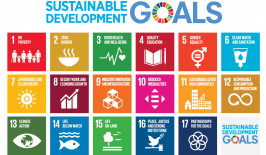The right to education is a human right. Article 26 of the United Nations Universal Declaration of Human Rights states:
“Everyone has the right to education. Education shall be free, at least in the elementary and fundamental stages. Elementary education shall be compulsory. Technical and professional education shall be made generally available and higher education shall be equally accessible to all on the basis of merit”.
The importance of education in all areas of life is undeniable and access to education is seen as a panacea to many global problems. This is anchored in Objective 4 of the Sustainable Development Goals (SDGs), namely “Ensure inclusive, equitable and high-quality education and opportunities for lifelong learning for all people”.
However, the focus in these areas continues to be mostly on primary education, especially in countries in Africa and Asia. Although more children than ever go to school, according to UNESCO, 264 million children and young people between the ages of 6 and 17 have no access to education worldwide. Clearly, there are no opportunities for lifelong learning here. When looking at university education, it becomes clear that it is mainly reserved for elites, especially in countries where tuition fees are charged.
The internet as a tutor
In this context, the function of ensuring equal opportunities has long been ascribed to the internet. With digital networking, it doesn’t matter where in the world you are or what means you have at your disposal. Thanks to the internet, it is now possible for one to inform and educate oneself freely. Unfortunately, this assumption does not take into account the vast amount of information that is disseminated via the internet. This requires the ability to separate the important from the unimportant and to assess the reliability of the source. Moreover, the issue of the digital divide remains a key obstacle.
Harvard for everyone – with open-source courses
The open source online platform EdX aims to provide education for all. The platform emerged in 2012 from the Massachusetts Institute of Technology (MIT) and Harvard University – two of America’s most prestigious universities. Over 120 different partner universities now offer courses via the platform, which can be taken free of charge. Almost all subjects are represented, from architecture and natural sciences to humanities and social sciences. The majority of courses are offered in English, with an increasing number of courses also offered in other languages such as Spanish, French or Chinese. EdX states that over 17 million people have taken their courses and that every country in the world is represented among its learners.
There are no formal admission criteria, which makes access easier for those people without formal or appropriate qualifications. Most courses are “self-paced”, i.e. courses in which enrolment is possible at any time and the time can be freely allocated. For a fee, you can also receive a certificate from the conducting university if a course is successfully completed. At this point, however, it can also be seen that education is still far from being free. Despite offering courses free of charge at its inception, over the past few years, it has introduced a contribution towards expenses for voluntary certification of between 49 and 99 USD. Through the introduction of so-called “Micro-Master” programs, courses at higher prices were also added to the platform. This development shows that education is still a market in which universities worldwide have to assert themselves.
After all: All courses can be taken free of charge if you do not want to be certified. Economic disadvantage is therefore no obstacle – at least not in the first place. Furthermore, the technical prerequisites, such as computer and internet access, must first be in place in order to be able to participate. Nevertheless, EdX offers a building block for lifelong learning. So why not take a topic – more topical than ever – as an opportunity and learn more about it? How about this, for example:
This article is a translation by Mark Newton of the original article by Jasmina Schmidt which first appeared on RESET’s German language site.






